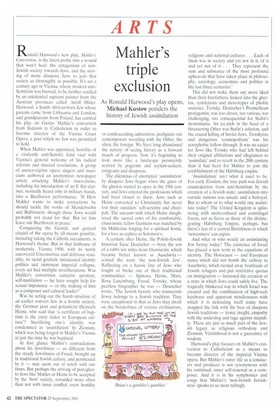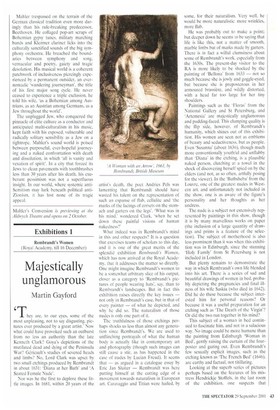Mahler's triple exclusion
As Ronald Harwood's play opens, Michael Kustow ponders the history of Jewish assimilation Ronald Harwood's new play, Mahler's Conversion, is the latest probe into a wound that won't heal: the antagonism of nonJewish society towards Jews. and the striving of many diaspora Jews to join that society as thoroughly as possible. It's set a century ago in Vienna, where modern antiSemitism was brewed, to be further curdled by an untalented aspirant painter from the Austrian provinces called Adolf Hitler. Harwood, a South African-born Jew whose parents came from Lithuania and London, and grandparents from Poland, has centred his play on Gustav Mahler's conversion from Judaism to Catholicism in order to become director of the Vienna Court Opera, a post which no Jew was permitted to hold.
When Mahler was appointed, hostility of a virulently anti-Semitic kind vied with Vienna's general welcome of his radical reforms and musical revelations. A group of ancien-regime opera singers and musicians authored an anonymous newspaper article attacking Mahler's innovations, including his introduction of an E flat clarinet, normally heard only in military bands, into a Beethoven performance. 'If Herr Mahler wants to make corrections he should tackle the works of Mendelssohn and Rubinstein, though those Jews would probably not stand for that. But let him leave our Beethoven in peace.'
Conquering the Gentile and genteel citadel of the opera by all means possible, including taking the Catholic sacraments, is Harwood's theme. But in that hothouse of modernity. Vienna 1900, with its newly uncovered Unconscious and delirious sexuality, its racial goulash, intoxicated identity polities and imminent imperial collapse, every act had multiple reverberations. Was Mahler's conversion careerist apostasy, self-mutilation — he later sought help for sexual impotence — or the making of him as a composer and cultural leader?
Was he acting out the harsh intuition of an earlier convert Jew in a hostile society, the German poet and polemicist Heinrich Heine, who said that 'a certificate of baptism is the entry ticket to European culture'? Sacrificing one's identity was condemned as 'assimilation' by Zionism, which was being forged in Mahler's Vienna at just the time he was baptised.
At first glance Mahler's contradictions about his Jewishness — so different from the steady Jewishness of Freud, brought up in traditional Jewish culture, and permeated by it — may seem out of synch with our times. But perhaps the striving of post-ghetto Jews like Mahler or Heine to be accepted by the 'host' society, rewarded more often than not with inner conflict, overt hostility or condescending admiration, prefigures our contemporary wrestling with the Other, the alien, the foreign. We have long abandoned the naivety of seeing history as a forward march of progress. Now it's beginning to look more like a landscape persistently scarred by pogroms and asylum-seekers, emigrants and diasporas.
The dilemmas of attempted 'assimilation' by diaspora Jews began when the gates of the ghettos started to open in the 19th century., and Jews entered the professions which had been closed to them. Jews such as Heine converted to Christianity but never lost their outsiders' self-scrutiny and chutzpah. The sarcasm with which Heine slaughtered the sacred cows of his comfortable, chauvinistic fellow Germans was matched by his Mahlerian longing for a spiritual home, for a love as replete as Solomon's.
A century after Heine, the Polish-Jewish historian Isaac Deutscher — born the son of a rabbi ten miles from Oscwiecim, which became better known as Auschwitz — coined the term 'the non-Jewish Jew'. Reflecting on a heroic line of Jews who fought or broke out of their traditional communities — Spinoza, Heine, Marx, Rosa Luxemburg, Freud, Trotsky, whose peerless biographer he was — Deutscher wrote, 'The Jewish heretic who transcends Jewry belongs to a Jewish tradition, They were exceptional in that as Jews they dwelt on the borderlines of various civilisations, religions and national cultures . . Each of them was in society and yet not in it, of it and yet not of it . . . They represent the sum and substance of the most profound upheavals that have taken place in philosophy, sociology, economics and politics in the last three centuries.'
This did not make them any more liked than their forefathers, locked into the ghettos, restrictions and stereotypes of phobic societies. Trotsky, Deutscher's Promethean protagonist, was too clever, too various, too challenging, too consequential for Stalin's monomania. An ice-pick in the head of a threatening Other was Stalin's solution, and the crazed killing of Soviet Jews, Trotskyists and dangerous 'cosmopolitans' was his xenophobic follow-through. It was no easier for Jews like Trotsky who had left behind their original affiliations and allegiances to 'assimilate' and to revolt in the 20th century than it had been for Mahler to join the establishment of the Habsburg empire.
`Assimilation' isn't what it used to be. For early Zionists. the true path was Jewish emancipation from anti-Semitism by the creation of a Jewish state: assimilation into outside nations was unsafe and a betrayal. But to whom or to what would one assimilate today? The United Kingdom is splintering with multi-cultural and centrifugal forces, not as fierce as those of the disintegrating Habsburg Empire, perhaps, but there's less of a central Britishness to which 'newcomers' can aspire.
And what or who would an assimilating Jew betray today? The existence of Israel has placed a new term in the equations of identity. The Holocaust — and European states which did not bomb the railway to Auschwitz, which turned away boatloads of Jewish refugees and put restrictive quotas on immigration — hastened the creation of a state in which Jews could safely live. The tragically blinkered way in which Israel was created and the combination of high-tech hardware and apparent mindlessness with which it is defending itself today have snapped the link with the best of diaspora Jewish traditions — ironic insight, empathy with the underdog and rage against stupidity. These are just as much part of the Jewish legacy as religious orthodoxy and Zionism. Victimhood is not a guarantee of wisdom.
Harwood's play focuses on Mahler's conversion to Catholicism as a means to become director of the imperial Vienna opera. But Mahler's outer life as a conductor and producer is not synonymous with his continual, inner self-renewal as a composer. And it is in his symphonies and songs that Mahler's 'non-Jewish Jewishness' speaks to us most tellingly. Mahler trespassed on the terrain of the German classical tradition even more daringly than his rule-breaking predecessor, Beethoven. He collaged pop-art scraps of Bohemian gypsy tunes, military marching bands and Klezmer clarinet licks into the culturally sanctified sounds of the big symphony orchestra. He breached the boundaries between symphony and song, vernacular and poetry, gaiety and tragic desolation. His musical world is a coherent patchwork of inclusiveness piercingly experienced by a permanent outsider, an evernomadic 'wandering journeyman', the title of his first major song cycle. He never ceased to experience a triple exclusion, he told his wife, as a Bohemian among Austrians, as an Austrian among Germans, as a Jew throughout the world'.
The unplugged Jew, who conquered the pinnacle of elite culture as a conductor and anticipated multi-culturalism in his music, kept faith with his exposed, vulnerable and radically solitary sensibility as a Jew on a tightrope. Mahler's sound world is poised between purposeful, ever-hopeful journeying and a naked confrontation with death and dissolution, in which 'all is vanity and vexation of spirit'. In a city that forced its Jews to clean pavements with toothbrushes less than 30 years after his death, his exuberant pessimism was not a superfluous insight. In our world, where systemic antiSemitism may lurk beneath political antiZionism, it has lost none of its tragic appeal.
Mahler's Conversion is previewing at the Alchiych Theatre and opens on 2 October.







































































 Previous page
Previous page